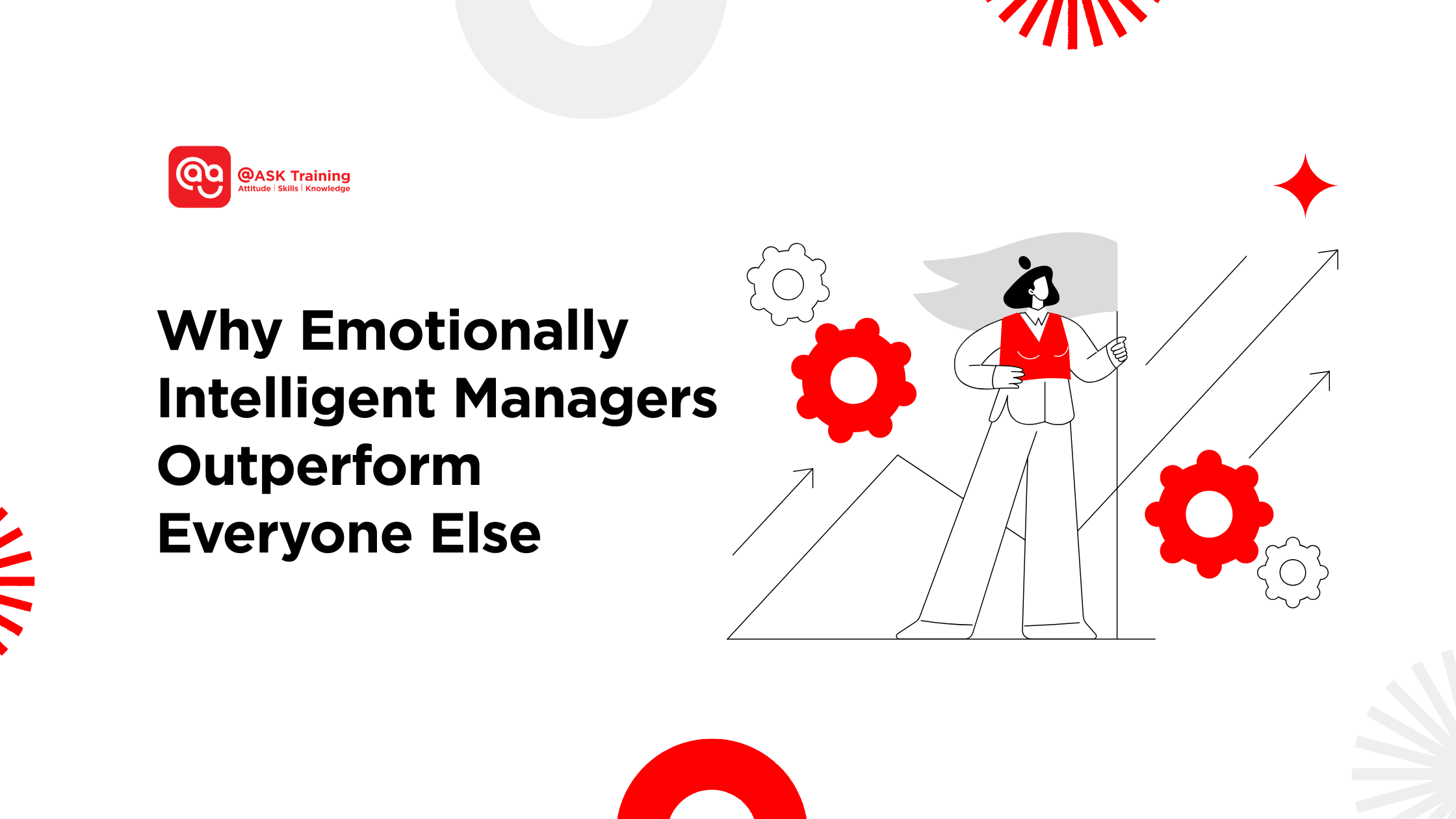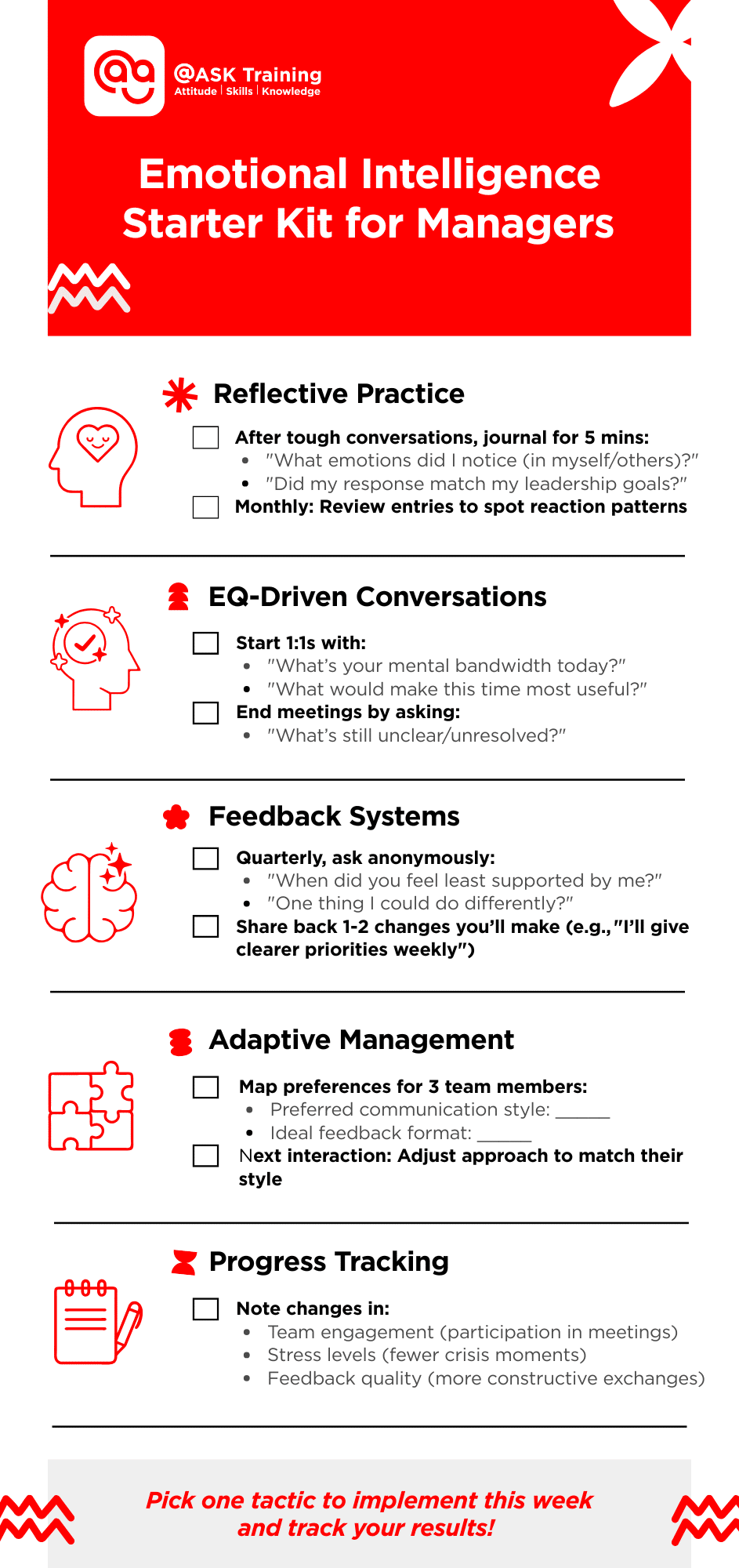Great managers aren’t defined by technical expertise alone. They’re distinguished by emotional intelligence (EQ).
While IQ may secure a leadership position, EQ determines whether you inspire lasting loyalty, navigate complex conflicts, and build resilient teams capable of weathering organisational storms.
Emotionally intelligent leaders fundamentally rewrite the rules of effective management through human-centred leadership, applying EQ at work to drive measurable results.
This article will explore:
- Why EQ has become the top priority for modern leadership
- The key traits that set emotionally intelligent managers apart
- Practical strategies to develop your leadership EQ
- How to build a high-EQ culture that boosts retention and innovation
But what makes EQ so critical in today’s workplace? Let’s explore why it’s indispensable for modern managers.
Why Emotional Intelligence is Essential in Management
Managing people requires daily navigation of motivation gaps, interpersonal conflicts, and turnover risks. Emotionally intelligent managers possess the unique ability to sense team disengagement early, address underlying tensions proactively, and adapt their approach during periods of organisational upheaval.
In other words, emotional intelligence for managers isn’t just about being ‘nice’, it’s a strategic tool for navigating conflicts, motivating teams, and driving performance during uncertainty.
This transcends mere “soft skills” to become strategic leadership. Research from Harvard Business School Online confirms that 71% of employers value EQ more than technical skills.
Teams led by high-EQ managers demonstrate concrete advantages, including 54% lower attrition (Gallup) and 20% higher productivity.
These leaders transform human capital into competitive advantage. Emotional intelligence in business isn’t optional; it’s the cornerstone of success.
So, how do emotionally intelligent managers actually lead? Their approach hinges on specific, learnable traits.
Emotionally Intelligent Managers Lead Differently
What truly separates exceptional leaders isn’t how they manage workflows; it’s how they manage relationships. These EQ traits form the core of advanced people management skills, transforming how leaders foster trust and accountability.
Let’s dive in.
Empathy
Empathetic managers actively listen without judgment, seeking to understand the hidden drivers behind team behaviours.
When confronting missed deadlines, they inquire, “What obstacles are slowing you down?” instead of issuing reprimands.
This approach builds profound trust, deepens employee loyalty, and directly reduces costly attrition by making people feel valued as humans rather than resources.
Composure
Leaders with strong emotional intelligence demonstrate calmness during crises, helping prevent panic from spreading within their teams. Facing a project meltdown, they maintain solution-focused dialogue rather than assigning blame.
Their regulated responses stabilise team focus, improve decision quality under pressure, and reduce stress-driven turnover by creating psychological safety.
Constructive Feedback
EQ-driven managers transform criticism into development opportunities through carefully framed language.
Contrast “Your report missed key data, let’s refine your research approach” with “This is sloppy work“.
Their method preserves motivation while encouraging accountability, ultimately cultivating a growth culture where improvement matters more than perfection.
Adaptability
Emotionally intelligent leaders adapt their communication styles to connect with individual needs.
They mentor analytical staff through data-driven conversations while inspiring big-picture thinkers with visionary storytelling.
This contextual awareness significantly boosts engagement by ensuring every team member feels profoundly understood.
Inclusion
High-EQ managers thoughtfully foster a sense of equality in participation by gently amplifying quieter voices and softly moderating more dominant ones. A simple “Alex, we haven’t heard your perspective. What are your thoughts?” can unlock innovation.
This deliberate inclusion fosters psychological safety, enhances collaboration, and drives breakthrough ideas from diverse viewpoints.
Self-Awareness
Exceptional managers regularly examine their own blind spots through reflective questioning like “Did my tone land as intended?” or “Did I dismiss ideas too quickly?”
This ongoing self-assessment prevents leadership hubris and creates cultures of continuous improvement where feedback flows upward as freely as downward.
Let’s have a bit of fun with the table below:
What Type of EQ Manager Are You?
| Type | What They’re Great At | Common Pitfalls | What to Improve | Typical Mindset |
| Empathetic | Sensing unspoken team issues | Absorbing others’ stress | Balancing empathy with accountability | “How’s this really going for you?” |
| Composed/Calm | Staying calm under pressure | Coming off emotionally distant | Showing appropriate vulnerability | “Let’s focus on solutions.” |
| Feedback Expert | Giving motivating feedback | Avoiding hard truths | Being direct with care | “What if we tried this instead?” |
| Adaptable | Adjusting to different personalities | Losing own voice | Knowing when to flex vs. hold firm | “Help me understand your perspective.” |
| Inclusive | Encouraging diverse voices | Over-engineering inclusion | Creating organic participation | “[Name], we haven’t heard from you yet.” |
These traits aren’t innate; they can be developed. Let’s explore how to cultivate them deliberately.
How to Build EQ as a Manager
Developing leadership-specific emotional intelligence requires moving beyond basic self-help strategies. Try these actionable steps:
1. Reflective Journaling:
Why it works: Regular reflection builds self-awareness by surfacing unconscious biases and emotional blind spots.
Action to Take:
After tough conversations, spend 5 minutes writing responses to:
- “What emotions did I notice in myself/others?”
- “Did I lead with curiosity or assumption?”
- “Did my response align with my intended leadership style?”
2. EQ-Driven Check-ins
Why it works: Normalising emotional dialogue prevents small issues from escalating.
How You Can Apply
Opening questions:
- “What energy are you bringing to this meeting?
- “What’s your mental bandwidth today?”
- “What’s one thing that would make this discussion more productive for you?”
Closing questions:
- “What’s still unresolved for you?”
- “How supported do you feel after this conversation?” (Scale of 1-10)
Incorporate into weekly 1:1s and team meetings for consistency.
3. Feedback Loops
Why it works: Direct input surfaces mismatches between intent and perception.
What You Can Do
A. Quarterly, ask:
- “What’s one way I could better support your work?”
- “When have you felt most/least heard by me?”
B. Use anonymous surveys (via Google Forms or Microsoft Forms) for honest responses.
C. Share key takeaways and action plans with the team (e.g., “You asked for clearer priorities, I’ll now send weekly objective recaps”).
4. Observe & Adjust
Why it works: Tailoring approaches maximise message retention.
Action You Can Take
A. Map preferences: Create a simple team chart noting:
- Preferred update style (email/Slack/verbal)
- Feedback format (direct/constructive)
- Optimal meeting times
B. Adjust in real-time:
- For analytical thinkers: Lead with data and structured options.
- For creatives: Frame discussions around vision and possibilities.
Commit to implementing one strategy this week. Track changes in team dynamics over 30 days.
Here’s a simple checklist for you to keep track of your progress:
But individual growth is just the start. To truly transform performance, EQ must permeate your team’s culture.
Building a High-EQ Culture
Emotionally intelligent leadership reshapes entire organisational ecosystems beyond individual success.
Teams operating with high psychological safety take 75% less sick leave (Harvard Business Review), while EQ-driven workplaces experience 65% lower turnover (Forbes).
3 Signs Your Culture Lacks EQ
- High turnover despite competitive salaries.
- Stagnant innovation due to fear of speaking up.
- Feedback flows top-down only.
3 Cultural Shifts Under EQ Leadership
Applying EQ at work starts with leaders modelling behaviours such as:
- Leaders model vulnerability by sharing mistakes and growth areas.
- Feedback flows fluidly in all directions without hierarchical barriers.
- Disagreements transform into collaboration opportunities instead of conflict.
Forbes aptly states, “A culture driven by emotional intelligence can outperform technically superior but emotionally blind workplaces.”
This cultural foundation enables sustainable innovation.
Wrapping Up
Emotional intelligence isn’t just beneficial. It’s essential for leadership to remain sustainable and impactful in our human-centred workplaces. Technical skills enable tasks to be managed efficiently, but emotional intelligence inspires people to achieve extraordinary results.
Start small this week: Practice just one feedback reframe or conduct a single empathy-driven check-in.
Small, consistent actions compound into leadership transformation!
Ready To Transform Your Leadership Impact?
For those looking to deepen their skills, explore @ASK Training’s range of Leadership and Management courses, designed to help managers and leaders like you in mastering the human side of leadership and not just processes!
Courses you can consider:
- Mastering Emotional Intelligence: Your Key to People Management Excellence
- People Centered Leadership- Motivating, Inspiring and Engaging Others
- Dynamic Communication and Collaboration with LEGO® Serious Play®
Enrol in our courses today and develop the skills that turn good managers into extraordinary leaders!


